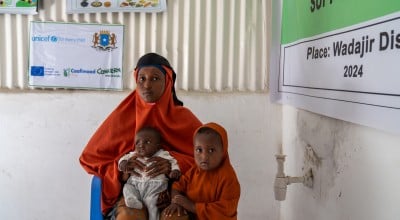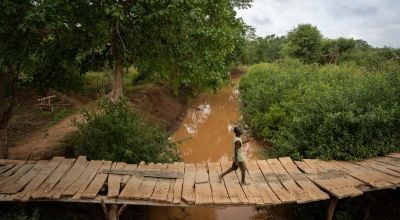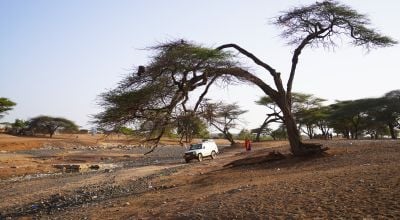
Read our 2024 annual report

Knowledge Hub
Education to leave no-one behind in Somalia
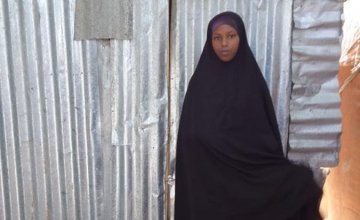
Being a child in Somalia can be hard – and thirteen year old Amal Ali Ibrahim’s story exemplifies that more than most. Having lost her mother at the tender age of three months, Amal has lived all her life with her father in Siliga internally displaced people’s (IDP) camp in Wadajir district.
Over one million people live in camps for displaced people in Somalia. Life there is difficult – especially for children – with limited access to protection and basic services, and a high risk of disease. Acute malnutrition rates in IDP camps are reported to be consistently above the World Health Organisation’s threshold of 15 percent. According to the UN 215,000 children under five in Somalia are acutely malnourished, with a further 40,000 severely malnourished.
Acute social deprivation
With Amal’s father unemployed and her siblings unable to get work, the family’s vulnerability is intensified by dependence on relatives and neighbours for survival. Access to educational opportunities for Amal has been limited. While Somalia once had a comprehensive education system that provided free and inclusive education from Kindergarten right through to university, years of instability have devastated the education system. The country now has one of the world's lowest enrolment rates for children of primary school age. It’s estimated that at least one million children between six and thirteen years of age are currently out of school, and that Somalia is on track to have one of the highest proportions of disenfranchised youth globally.
Every girl has a dream to graduate from a university and help her family.
These are Amal’s own words. But against this backdrop, achieving such an ambition might have seemed an impossibly uphill battle – until recently.
Children of Peace programme
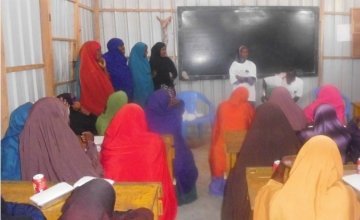
Funded by the EU Children of Peace initiative, the Conrad Foundation, and a donation by a major donor, Concern Worldwide currently supports four Accelerated Basic Education (ABE) centres in IDP camps on the outskirts of Mogadishu, and eight formal schools in Banadir (Mogadishu) and Lower Shabelle regions of southern Somalia. A total of 4,981 children currently benefit – including Amal, who matched selection criteria for the Siliga ABE centre, being from one of the poorest, most marginalised sectors of society.
Time to catch up
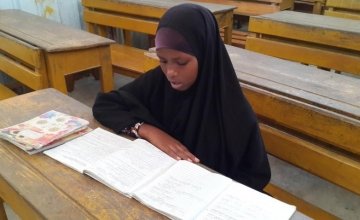
ABE centres are geared specifically to the needs of children from displaced families, affording children like Amal an opportunity to “catch-up” in terms of core literacy and numeracy skills which will enable her to re-join primary school at a later date.
When Amal was registered for the centre she was provided with all the materials she needed: books, a pencil and sharpener, a school bag, erasers, and crayons and pens. Immediately, she blossomed, showing a commitment that quickly enabled her to catch up with her classmates and become elected as class prefect.
Unfortunately Amal's father’s landlord suddenly increased the house rent and the family had to make the difficult decision to move to alternative accommodation in Heliwaa district – 8km from the ABE centre. Amal left the school and was devastated. “It was the saddest day of my life and I feared being out-of school again," she told us. Her teacher Sagal said her move affected everyone in the classroom: "Amal's classmates felt bad attending the ABE centre in the absence of their lovely friend.”
Community support
Anticipating such disruptions, and how the community might aid children in these situations, however, is also part of Concern’s broader Children of Peace programme in Somalia. In addition to training and supporting 134 teachers, we also support 90 Community Education Committee (CEC) members to improve school management capacity.
Fortunately, two weeks after Amal moved, members from the local Community Education Committee and her classmates’ parents offered Amal's family a small hut in Siliga IDP camp so she could come back and continue her studies with her friends. Amal explained what it meant to her:
When I arrived back, I thought that I was reborn and it was the happiest moment in my life, all my classmates welcomed me with happiness and joy.
The names in this blog have been changed for security purposes.
Read more



